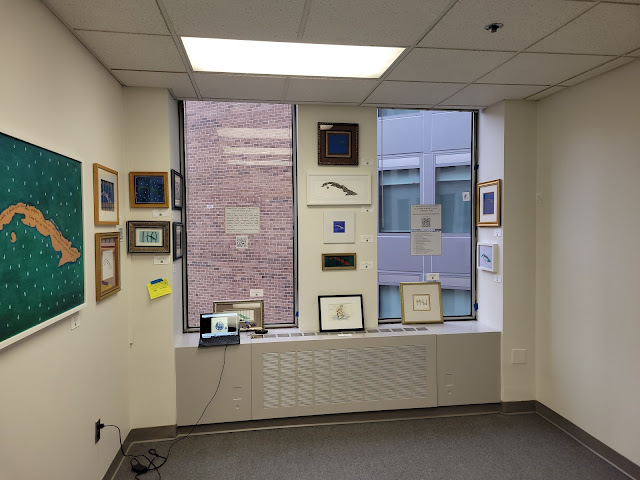 |
| Florencio Lennox Campello, Room 4086A at Artomatic 2024 |
Since 2003... the 11th highest ranked art blog on the planet! And with over SEVEN million visitors, F. Lennox Campello's art news, information, gallery openings, commentary, criticism, happenings, opportunities, and everything associated with the global visual arts scene with a special focus on the Greater Washington, DC area.
Here's some of the rooms which caught my eye as I strolled through the 5th floor art Artomatic... The planet's largest open art show - over 1,000 artists - opens on March 8th from 5-9PM!
Once again... thick skin ops!
Thank you for submitting artwork to Open Call for Washington Project For the Arts’ Collectors' Night 2024 Benefit Auction! We received over 250 submissions and appreciate your effort and interest in participating. We regret to inform you that we did not select your work for inclusion in the auction this year.
We hope you will stay connected by signing up for our e-newsletter or following us on Instagram if you haven't already. We post opportunities throughout the year including an Open Call for project ideas later in the fall.
Please feel free to get in touch with any questions. Thanks again for submitting, and we wish you the very best!
Sincerely,
Emily Fussner
Events Manager & Resident Designer
WASHINGTON PROJECT FOR THE ARTS
2124 8th Street NW, Washington, DC 20001
wpadc.org | @wpadc
Just found this online -- it is footprints like this one that make you aware of what you leave behind as an artist.
The Jacob Kainen Art Trust has enlisted the award-winning director Mark Covino (A Band Called Death, The Crest), and producer Jon Gann (Miss Alma Thomas: A Life in Color, Karen Carpenter: Starving for Perfection) to create a short documentary exploring the life and art of Jacob Kainen (1909-2001), one of the most influential artists of the 20th century.
“Jacob Kainen: An Artists’ Artist” follows the life of Kainen, a prolific but often overlooked artist of 20th Century America. From his immigrant upbringing to his rebellious artistic journey in NYC, his leftist ideologies and eventual impact on the D.C. art scene, Kainen’s story is one of perseverance and passion.
Despite facing challenges like McCarthyism and career limitations, he found solace in his art, especially with the support of his second wife, Ruth. His legacy as an artist’s artist and influential mentor endures, shaping generations of artists to come.
Jacob was not only a beloved painter and printmaker, but also as a curator, mentor, teacher, and a major force in developing the post-war Washington, D.C. art scene. His work is featured in major museum collections, including the National Gallery of Art, the Museum of Modern Art, the Whitney Museum of American Art, and the Smithsonian American Art Museum.
Narrated in Kainen’s own voice, unearthed from a treasure trove of recently discovered tapes, the film promises an intimate portrayal of the artist's tumultuous journey. His story will be further explored by curators Jonathan F. Walz (The Columbus Museum) and Seth Feman (Frist Art Museum), alongside perspectives from prominent art historians, artists, and Kainen’s own son, Dan Kainen, audiences will be immersed in the rich tapestry of Kainen’s life and artistry.
While the initial funds have been secured, the project seeks additional support to license archival materials, ensuring the preservation of Kainen’s legacy for posterity. Every contribution paves the way for a deeper understanding of Kainen’s impact on the art world and his influence on future generations of artists.
“Kainen’s role in shaping American modernism, particularly in Washington, D.C., is a narrative long overdue for exploration. This documentary serves as a vital conduit for a new generation of art enthusiasts and historians to rediscover his profound contributions,” remarks Jonathan F. Walz, curator at The Columbus Museum.
More information on the project is online at www.jacobkainen.com/donate
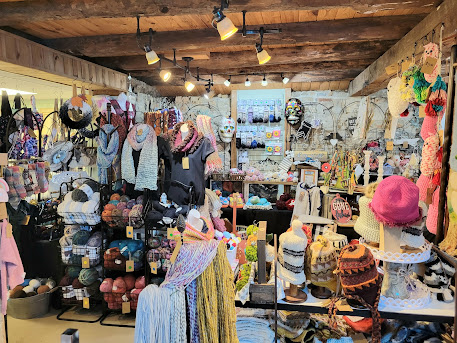 |
| Inside of 'Pretty on Y'all' in Luray, Virginia |
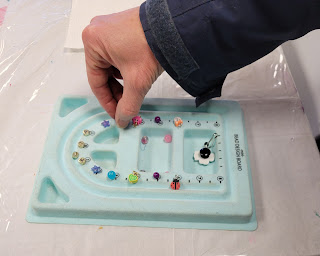 |
| Making a bracelet for Mila at 'Pretty on Y'all' in Luray, Virginia |
 |
 |
| Alida standing at Hank's Grille's parking lot |
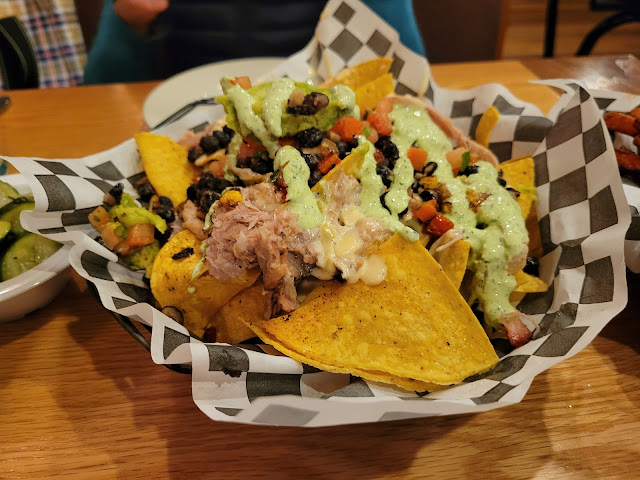 |
| Nachos Carnitas from Hank's Grille & Catering |
DMV artist Zofie King has a solo show "Metamorphic Reverie" at Fred Schnider Gallery in Arlington, VA!
The show opens with a reception on March 2, 5-8pm, and runs through April 21, 2024. There will be an artist talk on April 6, 5-7pm, and a closing reception on Saturday, April 20, 5-7pm. Hope I get to see you at one of these events!
888 N Quincy St., # 102 Arlington, VA
301-852-8942
gallery@fredschnidergallery.com
Thursday - Saturday, 12-7 pm, Sundays 12-5 pm.
 |
| This is my wall in room 5086-A at Artomatic 2024 |
 |
| These are also part of my wall in room 5086-A at Artomatic 2024 |
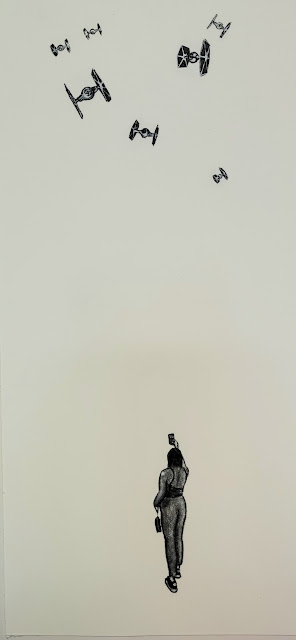 |
When the Empire finally arrived to the Earth, she was the first one to post them to TikTok 18x9 inches, charcoal on paper c. 2024 by Florencio Lennox Campello |
Studio Gallery is so excited to be partnering with their neighbors the IA&A at Hillyer, The Phillips Collection, ADA Gallery, Washington Studio School, and the Korean Cultural Center this February to offer Third Thursdays!
Meet & Greet with Artist Wayne Paige (Lower Level)
6-8 pm
Free to the public
*Studio Gallery's upper level will only be open from 5-6 pm.
 |
| The Good One by Wayne Paige |
Bottom Line Up Front: An opportunity for DMV area miniature artists to have their work curated into a world-class art fair in New York City this coming Fall.
Summary: I have been retained by Ramsay Fairs, a British-based art fair empire that runs art fairs in the United States, Asia and Europe to curate a wall of miniature art to be exhibited and sold at the Affordable Art Fair New York City this coming Fall.
Ramsay Fairs is one of the biggest art fair organisers globally, running 19 fairs a year with over ¼ million visitors. Through a portfolio of art fairs that includes Affordable Art Fair, VOLTA and British Art Fair, we inspire people to collect and enjoy art at every level.
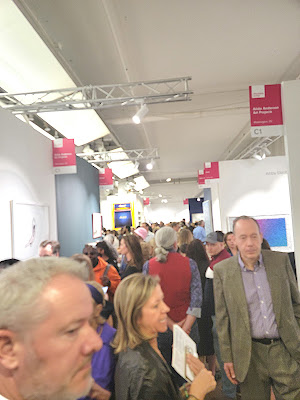 |
| Preview Night of the 2023 Affordable Art Fair NYC |
Definition of miniature art: I am educated by this Council for the Arts website that a:
"commonly accepted American guideline among many of today's miniaturists is that subjects do not exceed one-sixth their natural size. Exceptions are permitted for abstractions or tiny subjects not lending themselves to the "one-sixth" application provided they Embrace the delicate essence and spirit of miniaturism."
Our own Miniature Painters, Sculptors & Gravers Society of Washington, D.C. (MPSGS), which has been around since 1931 adds:
This unique art form, based on a minute scale, traces its roots back to the book paintings and illuminated manuscripts set in the 7th century. A work of fine art in miniature is a particularly personal object that draws the viewer into an intimate, concentrated little world that is breathtaking in its execution. Every single detail is miniaturized -- the scale of the subject matter, the brush or pencil strokes -- so that only with high magnification can one behold the immaculate details of the artist's technique which may include stippling, hatching, or pointillism. These techniques are a specialized means of producing a perfect balance of color and detail in a series of thinly applied layers of exquisite color intended to reflect light. The miniatures show a high standard of design and the artist's mastery of the chosen media and palette.
For this exhibition, no 2D framed work shall be larger (including frame) that 8x10 5x7 inches and any 3D work cannot be longer than six (6) inches in any direction.
I plan to have two rounds of jurying:
1. Initially I will selecting semi-finalists from digital images - either emailed to me, or available online once a link is provided. Each artist can submit up to three works for consideration.
2. I will then review all round one selected artworks for in-person review of the actual work to ensure that the actual artwork meets professional presentation standards as demanded by the art fair guidelines.
3. This round two review will be done at a local art gallery or space (to be announced later) with ease of access and parking, etc. This means that the work will have to be brought in - not shipped for this round of final review.
At this point I will sign for and keep all selected works and pack them for transportation to the fair. Each work will be identified by:
Cost to enter the process: Free
Selected work will be driven to the fair by me, installed by me at the fair, and all sales will be run by the gallery at the fair. Artists will be paid within a week after the fair and provided with the full contact details of the purchaser.
Unsold works will be returned at a selected date after the fair, and must be picked up in person; there will be no shipping back to artist options.
More later... I will design and upload an entry form which artists can use as a reference once the delivery/pick-up locations have been solidified; meanwhile if you have any questions, please send me an email to lennycampello@hotmail.com
I applied to become a mentor/consulting artist in my own county - and just got rejected!
Another example of why artists need to have thick skins!
How do I feel? I wish whoever they picked 1000% congrats and a load of success!
Parts of me do wonder... cough... cough...
From: Flannery Winchester Flannery.Winchester@creativemoco.com
Fri 2/9/2024 2:06 PM
Dear Florencio,
On behalf of AHCMC, we would like to thank you very much for your submission to our Request for Qualifications for the Consulting Artist position. While our selection committee appreciated the opportunity to learn more about your artistic practice and were impressed with your credentials, your application was regrettably not selected for this position.
We hope to have the opportunity to collaborate with you on future public art projects in Montgomery County.
Thank you for your time and efforts during this process. If you have any questions, please do not hesitate to let me know.
Warmly,
Flannery
Flannery Winchester
Public Art Program Manager
1511361269793_image002.png
801 ellsworth drive, silver spring, md 20910-4438
Arts & Humanities Council | Blog | Twitter | CultureSpotMC| Facebook | MontgomeryTraditions
Back in 1994, I was living near a farm in Virginia with lots of these...
This work just showed up today at a local, DC area auction house - bid for it here.
|
|
Waverly Street Gallery Presents
2024 Invitational Show
Featuring work by members and their guests
On display through March 2nd, 2024
Come to the opening reception! Friday, February 9th, 6-8pm. |
An exhibition of over 30 artists! Come see the vibrant work of a community of creators. Ceramics, Paintings, Fiber Arts, Sculpture, Glass, Drawings, Jewelry, Prints, Photography and More! |
Waverly Street Gallery 4600 East West Highway, Bethesda, MD 20814
(301)-951-9441
waverlygallerybethesda@gmail.com
Hours: Thursdays, Saturdays and Sundays 1 – 6 pm, Fridays 3 - 8pm, and by appointment
Gallery Artists: Barbara Bickley, Rachel Carren, Dennis Crayon, Geoff Desobry, Bruce Paul Gaber, Mariah Gugel, Wanjin Kim, Keith Kozloff, Barbara Mierau-Klein, Matthew Nance, Jan Long, Grace Peterson, Michele Rubin, Marc Schneiderman, Pat Silbert, Kanika Sircar, Claire Wright
Get ready for the 26th Bethesda Row Arts Festival, happening on September 7-8, 2024! We are thrilled to announce that artist applications are now open. Situated in the vibrant heart of Bethesda, Maryland, our festival spans five bustling blocks and has been hailed as one of the top 30 Fine Art Shows in the country by the "Art Fair Sourcebook.
Expect to engage with 25,000 discerning attendees from the affluent and educated communities of the Washington, DC Metro Area, including Bethesda, Chevy Chase, and Upper Northwest. The sphere of influence of the festival extends to a three-mile radius, known for its high average household income of $196,910.
We employ a comprehensive marketing plan that encompasses a wide range of platforms, from a robust social media campaign to traditional print and radio ads. With the support of our PR firm, local chamber of commerce, and urban district, we continually strive to involve the community and reach new potential attendees. Notably, our visibility has been amplified by appearances on NBC, FOX, WTOP (news radio), and WAMU (public radio).
Due to the late timing of the Jewish holidays and other events in Bethesda, we are moving the festival to new dates.
SEPTEMBER 7-8, 2024
New Documentary on Artists’ Artist Jacob Kainen Slated for Spring Production, Fall Release!
Award-Winning Director Mark Covino tagged to helm film spotlighting one of America’s most influential, under looked 20th century Modernists.
The Jacob Kainen Art Trust has enlisted the award-winning director Mark Covino (A Band Called Death, The Crest), and producer Jon Gann (Miss Alma Thomas: A Life in Color, Karen Carpenter: Starving for Perfection) to create a short documentary exploring the life and art of Jacob Kainen (1909-2001), one of the most influential artists of the 20th century.
“Jacob Kainen: An Artists’ Artist” follows the life of Kainen, a prolific but often overlooked artist of 20th Century America. From his immigrant upbringing to his rebellious artistic journey in NYC, his leftist ideologies and eventual impact on the D.C. art scene, Kainen’s story is one of perseverance and passion.
Despite facing challenges like McCarthyism and career limitations, he found solace in his art, especially with the support of his second wife, Ruth. His legacy as an artist’s artist and influential mentor endures, shaping generations of artists to come. Jacob was not only a beloved painter and printmaker, but also as a curator, mentor, teacher, and a major force in developing the post-war Washington, D.C. art scene.
His work is featured in major museum collections, including the National Gallery of Art, the Museum of Modern Art, the Whitney Museum of American Art, and the Smithsonian American Art Museum.
Narrated in Kainen’s own voice, unearthed from a treasure trove of recently discovered tapes, the film promises an intimate portrayal of the artist's tumultuous journey. His story will be further explored by curators Jonathan F. Walz (The Columbus Museum) and Seth Feman (Frist Art Museum), alongside perspectives from prominent art historians, artists, and Kainen’s own son, Dan Kainen, audiences will be immersed in the rich tapestry of Kainen’s life and artistry.
While the initial funds have been secured, the project seeks additional support to license archival materials, ensuring the preservation of Kainen’s legacy for posterity. Every contribution paves the way for a deeper understanding of Kainen’s impact on the art world and his influence on future generations of artists.
“Kainen’s role in shaping American modernism, particularly in Washington, D.C., is a narrative long overdue for exploration. This documentary serves as a vital conduit for a new generation of art enthusiasts and historians to rediscover his profound contributions,” remarks Jonathan F. Walz, curator at The Columbus Museum.
More information on the project is online at www.jacobkainen.com/donate
This post from well over a decade ago is still a good lesson -- the prices and estimates have gone up, keep that in mind:
A strategy for saving money on framing costs...According to some stats I read a few years ago in a framing trade magazine, the average cost of framing in the Greater DC region was $67 an hour. It’s probably more than that now.Other than time, framing two-dimensional work is often the most expensive step in organizing an exhibition (to the artist), and it’s astounding how little most art schools prepare students (and faculty) for avoiding the trap of spending a lot of money on framing.There are some steps that artists can take to significantly reduce the cost of framing. Here I will try to list the most common mistakes, how to avoid them, and more importantly, how to get your artwork framed for a lot less than taking it to a framing shop to get it framed.First and foremost: Prepare! Do not leave your framing to the very last minute. Having said that, I know that most of you will leave the framing to the last minute and then panic – go to your neighborhood framing shop, and drop way too much money to get custom frames made for your artwork. If you can afford it, and the price history of you artwork can sustain it – then skip this posting. But if you want to save a lot of money on framing, then prepare!Do not, under any circumstances let the gallery or a second party take care of your framing unless you have the full costs ahead of time and in writing. Otherwise you will get stuck at the end of your exhibition with a framing bill rather than a commission check.First of all: If (and only if) you can, work in standard sizes. Most photographers and painters already do. But unless your compositional demands call for it (like mine do), avoid working in one of a kind sizes. American and European standard sizes are different, but US sizes cover a huge range of sizes, such as 5x7, 8x10, 11x14, 12x16, 20x24, etc. If you can work within one of those sizes – i.e. do your watercolor on a sheet in one of those sizes, or print your photo on paper that size, etc. then half the battle is won, as then you should be able to buy ready-made frames that will automatically accommodate your matted work. This is important, as a good frame from any craft store, or from any art catalog, is usually a lot less than having one built from scratch! For example, a 16x20 metal molding frame, back metal brace/clips, wire, glass, pH-balanced acid free mat, hanging wire and acid free foam core backing is anywhere from $20 - $30 in any art catalog or locally (in the Greater DC region) from Apex in Alexandria. Having the exact same frame hand-made in a frame shop is around $100.If your work, because of composition or whatever, doesn’t fit into a standard size mat or frame, then another tactic is to go and shop for a ready-made frame that is larger than your artwork – at least three inches all around the diameter of the artwork. Then take that frame and your artwork to a frame shop and have them cut the mat for you. Now you are only paying for the labor and materials to cut a mat – not to build everything from scratch.If you can’t find a frame in a shop that fits your unique sizes, then shop through art supply catalogs and have them make you one. The savings over storefront framers is still significant. I personally buy a lot of frames from this place. Once you sign up, you get their catalogs as well, and then I hit them when they have a sale going on! From any supplier you can order moldings in one inch increments, so if your work is 18x30 inches, then you'd order a set of 18 inch molding, a set of 30 inch molding and it will be delivered with the hardware needed to assemble it - all you'll need is a screwdriver. Then visit your local glass shop for a piece of glass.Because most solo shows involve a larger number of works, you should start thinking way ahead of time as to the number of frames that you will need. If you can decide that you will need twenty frames for your show, and you know what size they will all be, then go shopping for ready-made frames in any of our local area arts and crafts stores, or other stores that stock frames, such as IKEA or Bed, Bath and Beyond. Once you find a frame that you like, turn it over and see who makes them. Write the manufacturer’s information down, and when you get home, call the manufacturer of the frame and place an order for the number of frames that you will need. You are now buying the frames wholesale and saving yourself the entire store mark-up!Don’t let the process of establishing an account with the frame manufacturer scare you. They may require an Employee Identification Number (EIN) – you can give them your social security number -- and they will have a minimum purchase (usually $250) – but by the time that you purchase 20-25 frames, that will be easy to meet. All you are doing is ordering the frame directly from the manufacturer rather than buying them through a store – it’s perfectly legal and saves you a considerable amount of money.If you work on canvas, you may not even need to frame them. Ask the gallery owner – a lot of galleries will be happy to hang canvasses that are “gallery dressed.” That means that the edge of the canvas wraps to the back and that’s where it is stapled – rather than the side. We actually prefer to show canvas paintings that way.Do not cheapen your artwork by choosing cheap materials. At all costs avoid using acidic mats (use only pH-balanced, acid free mats) and do not use cardboard to back the work – use acid free foam core. Using cheap materials not only damages the work eventually (as the acid migrates to the artwork) but also tells a potential collector that you are not serious as an artist to properly display your work. I am shocked at the number of badly hand-cut mats in acidic mats that I see in galleries all over the country – a lot of time is just plain ignorance of the business side of the fine arts – and the importance of presentation of artwork in a professional environment – such as a reputable fine arts gallery should be.If you are an artist that moves a lot of work a year, then you should seriously consider learning how to cut your own mats. A sheet of museum quality archival 32x40 inches mat board is around $6-8 and you can get four 16x20 inches mats from it. To have one 16x20 archival mat cut in a frame shop will be around $20. You can buy a decent mat cutter for around $150, and it comes with a video to teach you how to cut mats.The bottom line is that minimizing framing costs not only reduces the amount of money that an artist has to invest in offering a show, but also reduces the price point of the artwork – a very important issue, especially for young, emerging artists without a sales history track.